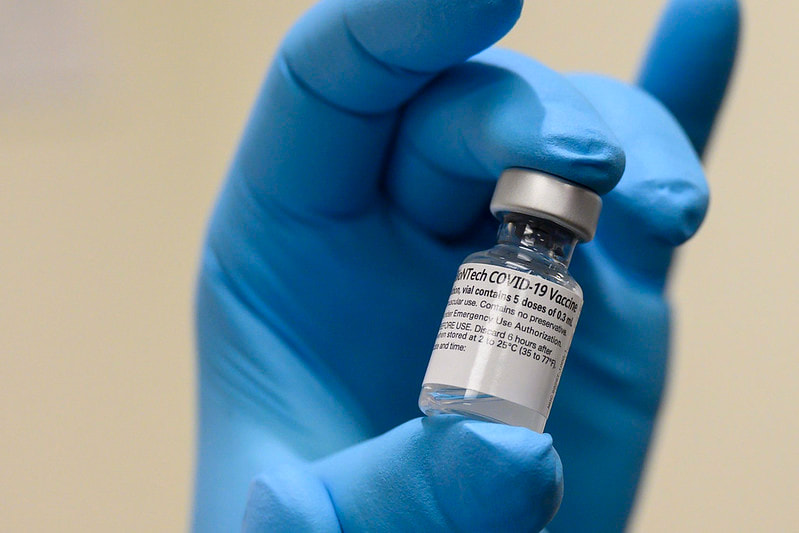|
There's an exercise I run in the final session of my ESG investing course. Students in their teams have to come up with an 'elevator pitch' to a senior colleague in a transition finance originations team for a new green bond or social bond. Last week, I ran this exercise with students from Warwick Business School. Several teams gave 'elevator pitches' proposing covid-related health bond issuance, and this got me thinking a little more systematically about what finance actually can do about covid.
One imperative in particular troubles me: global access to vaccines. Fair and equitable access to covid vaccines around the globe is required as a normative matter, and it is also of instrumental value to investors in that covid's drag on the global economy will not end until global infection rates are low enough to prevent deadlier versions of the virus from mutating. The surge in infection rates in India has also interrupted the global covid vaccine supply chain. A report by the International Monetary Fund this month concludes that "ending the pandemic in a timely manner is a global public good". The principal global intergovernmental coordination mechanism focused on ending the pandemic is the Access to COVID-19 Tools (ACT) Accelerator set up between the World Health Organization and eight other global health bodies. Within ACT, the primary mechanism for broadening access to covid vaccinations in developing countries is the COVAX programme, run by the intergovernmental agencies Gavi (the vaccine alliance), CEPI, and the WHO. Last week COVAX issued a statement setting out what they need in terms of funding and other help: https://www.who.int/news/item/27-05-2021-covax-joint-statement-call-to-action-to-equip-covax-to-deliver-2-billion-doses-in-2021. Since November 2020, Citi is the lead financial adviser to the COVAX programme on its vaccine procurement programme. Earlier this month the IMF issued a report (https://www.imf.org/en/Publications/Staff-Discussion-Notes/Issues/2021/05/19/A-Proposal-to-End-the-COVID-19-Pandemic-460263) which summarizes the funding gaps that must be filled to achieve 40% global vaccination coverage by the end of 2021, and 60% by H2 2022. Funding sources include $37 billion in existing grant commitments from governments and multilateral development banks, and a further $13 billion in grant money that has yet to be committed. The IMF report stresses that the plan requires full paid-up finance now, not just commitments. This is where the International Finance Facility for Immunisation (https://iffim.org/) could come into play. The IFFIm "receives long term, legally binding pledges from donor countries and, with the World Bank acting as Treasury Manager, turns these pledges into bonds. The money raised via Vaccine Bonds provides immediate funding for Gavi, the Vaccine Alliance." So it puts donor funding to work faster. The IFFIm has already issued a vaccine bond to accelerate funding of commitments of NOK 3bn by the Norwegian government. Here is the press release regarding that commitment in June 2020, expressing the intention to accelerate funding using a vaccine bond: https://iffim.org/press-releases/norway-contributes-nok-2-billion-iffim. The zero coupon amortising Vaccine Bonds were issued on July 7, 2020 (term sheet). Crédit Agricole CIB and Skandinaviska Enskilda Banken (SEB) acted as joint bookrunner. The largest investment was made by Dai-ichi Life. There were other investors in Asia and Europe. The Norwegian funding commitment that is made available on an accelerated basis by this bond issuance will be used for urgent COVID-19 vaccine research and development by the Coalition for Epidemic Preparedness Innovations (CEPI), part of the Gavi vaccine alliance. In February this year a group of 148 investors representing $14 trillion of assets under management and coordinated by the Access to Medecine Foundation called for financing action from governments (to make and fund funding commitments to the ACT accelerator), for greater active ownership by investors (i.e. an ESG issue) to get healthcare sector companies to do more (eg regarding intellectual property in vaccines, and vaccine production licensing), and thirdly this: “for governments and international organisations...to explore the feasibility of innovative finance mechanisms for national and global COVID-19 responses, similar to new vaccine bonds or social bonds being issued for COVID-19 programmes.” (i.e. similar to the innovative financing provided by IFFIm). Back in December last year, Citi was predicting a huge amount of vaccine bond issuance this year, but it has yet to happen. I recommend this article: https://au.finance.yahoo.com/news/analysis-vaccine-bond-sales-soar-070847728.html and also this article in the South African press about the need for vaccine bonds there: https://thoughtleader.co.za/a-case-for-covid-19-vaccine-bonds-in-africa/. Imagine pitching one of these to your colleagues.
0 Comments
|

 RSS Feed
RSS Feed
